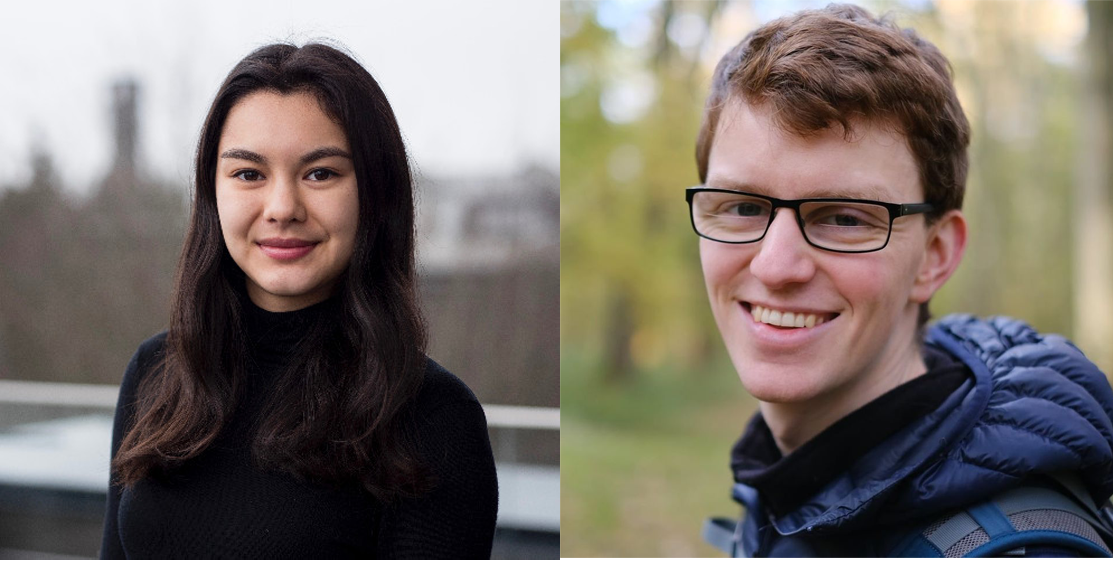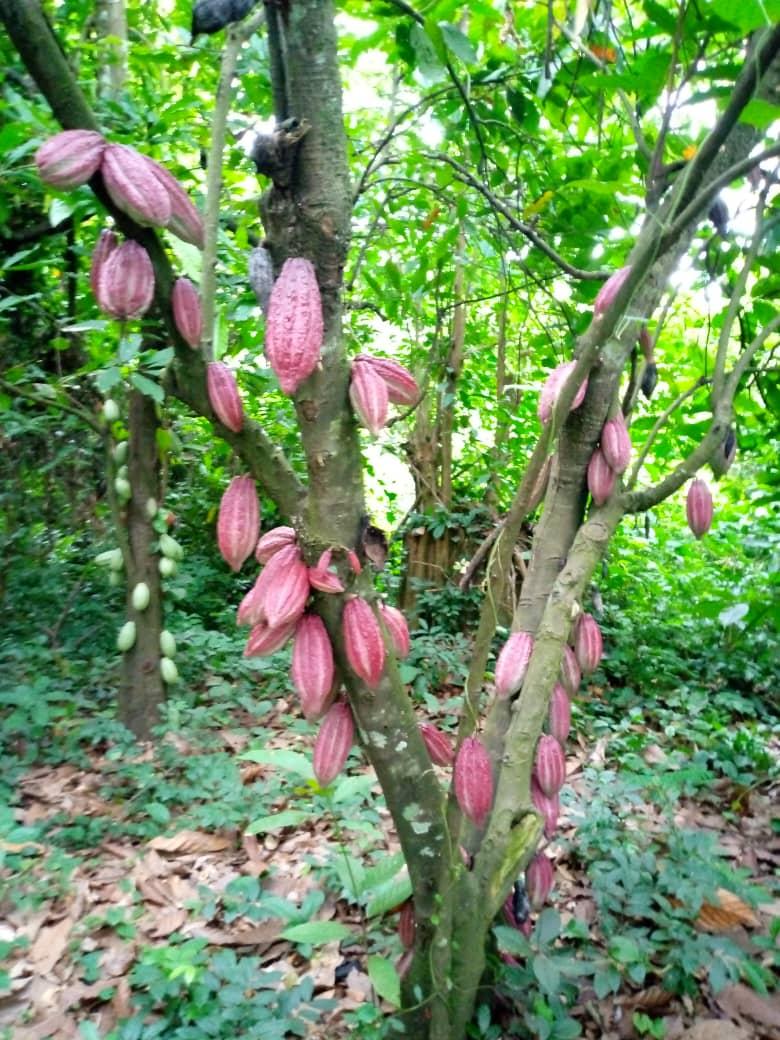Climate change is threatening West Africa's cocoa industry with rising temperatures and unpredictable rainfall, causing environmental and socio-economic challenges. In Nigeria, full-sun cocoa farming has led to deforestation and biodiversity loss.
However, a study by former ECI master’s students, Anita Koralewicz and Jan Vlcek, highlights renewed interest in traditional cocoa agroforestry as a climate adaptation strategy. Their research, published in Agroforestry Systems, emphasises the benefits of integrating shade trees into cocoa farms to restore forests and boost sustainability. In this Q&A they reveal more about their study and what they’ve done since completing their master’s degree.

L-R: Anita Koralewicz and Jan Vlcek
Why did you choose to do this particular study on cocoa agroforestry?
AK
I am passionate about food system sustainability—from production to consumption to disposal. This topic was always top of mind both before and during ECM, so I wanted it to be the focus of my dissertation. At the end of my first semester, my supervisor, Oliver Owen, circulated an email looking for dissertation students to collaborate with the Ekiti State Forestry Commission in Nigeria to contribute to the State’s forestry data baseline. I was immediately drawn to the opportunity, as it allowed me to explore the forestry-agriculture nexus in a different country and cultural context than my own.
With climate change and increasing volatility, the suitable range for cocoa is shifting, requiring farmers to adopt adaptive practices. Despite being one of Africa’s largest cocoa producers, Nigeria remains understudied compared to its neighbours. Agroforestry is particularly interesting because it serves as both a climate mitigation measure, through carbon sequestration, and an adaptation strategy, by creating microclimates. This study presented a valuable opportunity to generate insights that could inform both research and policy on land use.
JV
There were three reasons that motivated me to pick this specific study. Firstly, I wanted to do research with some practical impact. Once Ollie's request for research projects came out as Anita mentioned, I thought it would be a great way to achieve practical impact because the research program was in collaboration with the State of Ekiti on policy topics that were important to the state officials. Secondly, I was also interested in working on food systems as I have previously worked on topics in the space and wanted to deepen my understanding of it. And finally, I have done some work in the region prior to ECM and was hoping that I could visit Nigeria for research. This wasn't possible in the end due to Covid restrictions but instead we got to work with amazing local research assistants.
How long did the study take?
AK
The entire project, from initial brainstorming to submission, took about nine months. Planning began in January 2021, when we defined our research questions and scope. In April, we started the literature review and coordinated logistics for data collection. Due to COVID-19 restrictions, travel was cancelled, and we hired local research assistants instead. Data collection took place from June to August, followed by analysis and write-up, which concluded in September.
How did the study go - were the findings what you expected?
AK
Overall, the study was successful in uncovering new insights and strengthening collaboration between Oxford and the Ekiti State Government. We were surprised to find that agroforestry is the dominant form of cocoa production in Ekiti State. In other major cocoa-producing regions of West Africa, agricultural modernisation efforts have pushed for full-sun cocoa farming (growing cocoa without tree cover) to maximise yields. However, our findings suggest that tree retention on farms is driven by multiple factors, including farmers’ continued appreciation of traditional growing practices, conflicting policies and weak enforcement, and limited funding and training for adopting new methods.
JV
It was really interesting to see that agroforestry was the dominant method of cocoa growing in the state and I definitely didn't expect because it is quite different from neighbouring countries. My personal hypothesis is that it had a lot to do with the shift in Nigeria's economy away from cocoa towards oil & gas in the 2nd half of 20th century which kind of slowed down the changes in cocoa sector. It's interesting to see how over time, the general view on the 'best way' to grow cocoa shifted from agroforestry, towards full-sun and now is moving back to agroforestry - so the fact that that's how it is still grown in Ekiti could be a great basis for the State for the years to come. However, agroforestry is super complicated and there hasn't been enough research into how to utilise the systems well which makes it currently economically very challenging for the farmers.

How helpful was the ECM dissertation prize - would you still have been able to do the study without it?
AK
The dissertation grant was essential to the study. It covered costs for our research assistants, equipment, transportation, and small daily allowances. After submission, Jan and I jointly received the ECM dissertation prize. This funding motivated us to convert our dissertations into an article for publication, allowing us to dedicate time to writing.
JV
It was absolutely essential. Together with funding from Christ Church college, we wouldn't have been able to carry out and write up the research without it. As most of the funding went towards paying for the research associate's time, it was also great that the university contributed to Ekiti's economy.
Has the study shaped your subsequent work/interests?
AK
The study definitely deepened my interest in food systems and sustainability. It revealed so many complexities involved with sustainability challenges and dealing with diverse stakeholders. I learnt many project management skills that I now apply in my day-to-day job—from scoping and planning to recruitment and results delivery. While I am not directly working in food systems at the moment, I stay connected by keeping up with new research, understanding my local food context, and exploring potential work or volunteer opportunities in the field.
JV
Definitely! I have since visited a cocoa farm to learn more about cocoa growing and processing and have also attended a chocolate making workshop. I also love searching for specialty chocolates, looking at what types of cocoa beans they use - although I have to say that it's very hard to find chocolate that's clearly from Nigeria.
What are you doing now?
AK
I now live in Copenhagen, where I moved after completing ECM. I first joined BCG’s climate and sustainability practice, working on projects ranging from government aquaculture reports to sustainability organizational models. ECM played a significant role in shaping my understanding of governance and decision-making in both public and private sustainability contexts. Currently, I work in Corporate Strategy at Ørsted, the world’s leading offshore wind company. Here, I’ve gained a deep understanding of the renewable energy industry and help shape the company’s strategic direction.
JV
I live in Vancouver, Canada and work as a consultant for McKinsey & Company where I worked before the ECM & MBA as well. I work mostly on topics related to energy and agriculture. I think back to what I learned during ECM often and occasionally get to utilise some of the knowledge acquired during the research project.

Would you recommend the MSc Environmental Change Management (ECM)?
AK
Absolutely! ECM provides a strong foundation across a broad range of environmental and sustainability topics while allowing you to explore areas of personal interest in depth. You learn from leading researchers in the field as well as from a diverse group of bright and motivated peers working in various sustainability sectors. The network you build is both personally and professionally rewarding.
JV
Yes, I would totally recommend it! I've absolutely loved ECM for the diversity of backgrounds of my classmates, researchers and professors - I've had some of the most stimulating conversations and discussions, but it was also just a great fun. Student life in Oxford is amazing! I agree that the network is great professionally but also ECMers become friends for life. Anita and some of our classmates even came to my wedding!
Find out more
Read more on the findings of their study.
Read the paper in full in Agroforestry Systems: Mapping the extent and exploring the drivers of cocoa agroforestry in Nigeria, insights into trends for climate change adaptation
